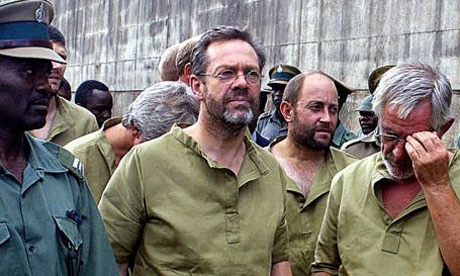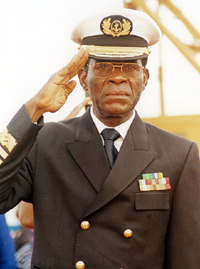 (Picture: Zelaya in the stetson in conversation with Arias in less stressful times.) Costa Rica President Oscar Arias has asked for more time to resolve Honduras’s political stalemate and warned that civil war was possible if the three-week crisis isn’t ended soon. Arias has met separately with ousted president Manuel Zelaya and his replacement Roberto Micheletti in the Costa Rican capital San Jose but has been unable to get either man to agree to the seven-point solution he presented on Saturday. “I want to take 72 hours to work more intensely,” said Arias. Because the alternative he said was “civil war and bloodshed that the Honduran people don’t deserve.”
(Picture: Zelaya in the stetson in conversation with Arias in less stressful times.) Costa Rica President Oscar Arias has asked for more time to resolve Honduras’s political stalemate and warned that civil war was possible if the three-week crisis isn’t ended soon. Arias has met separately with ousted president Manuel Zelaya and his replacement Roberto Micheletti in the Costa Rican capital San Jose but has been unable to get either man to agree to the seven-point solution he presented on Saturday. “I want to take 72 hours to work more intensely,” said Arias. Because the alternative he said was “civil war and bloodshed that the Honduran people don’t deserve.”Arias may be grandstanding but he does have form as a peacekeeper. He won the 1987 Nobel Peace Prize for his efforts in getting five central American presidents to sign the Esquipulas peace accord in Guatemala. His seven point plan for Honduras calls for the formation of a national reconciliation government to be led Zelaya. It would also move forward planned elections to October from November and offer political amnesty to those involved in the crisis. But neither the old nor the new leader have been particularly helpful. Zelaya threatened to resort to other means if he did not get his way while Micheletti repeated his demand that Zelaya not return to power before he agrees to stand down.
The Council for Hemisphere Affairs says negotiation fatigue is beginning to make itself evident among the two sides after three weeks of deadlock. The crisis started on 28 June, the day Zelaya had scheduled a controversial non-binding plebiscite to determine if citizens should vote in November elections to change the constitution. Zelaya claimed the plebiscite was a merely a survey, but his opponents saw it as a means of giving him a second term of government when his current term expires in 2010.
Zelaya had sacked the head of the armed forces who refused to give logistical support for the vote. The Supreme Court overruled him, saying the army chief should be reinstated. On the morning of the vote, over 200 troops arrived at his home and ordered him to surrender on pain of death. They drove him to the airport and put him on a plane to neighbouring Costa Rica.
Later that day, Congress produced what it claimed was Zelaya’s letter of resignation. Speaker and constitutionally second in line to the presidency, Roberto Micheletti, was sworn in as interim leader. The new government issued arrest orders against Zelaya on 18 charges that include betrayal of the country and failure to fulfil his duties. Protests against the coup began immediately with several thousand pro-Zelaya supporters gathering near the Presidential Palace in Tegucigalpa. On 2 July, social organisations of workers, farmers and citizens held a massive march to deliver a message of gratitude for support for democracy at the UN office. After two days, Congress had enough and approved a decree to enforce a curfew and declare a “state of exception” which banned meetings, curtailed travel, justify search without warrants and imposed restrictions on the media.
 Zelaya continues to have the support of the OAS (Organisation of American States) but is no closer to getting home. On 5 July he tried to fly back home but his plane was blocked from landing. While Zelaya is a wealthy land-owning cattle baron and timber merchant he derives most of his support from Honduras’s poorest people. Almost half the population survives on $2 a day or less with one in five considered undernourished.
Zelaya continues to have the support of the OAS (Organisation of American States) but is no closer to getting home. On 5 July he tried to fly back home but his plane was blocked from landing. While Zelaya is a wealthy land-owning cattle baron and timber merchant he derives most of his support from Honduras’s poorest people. Almost half the population survives on $2 a day or less with one in five considered undernourished. Honduras is hopeless corrupt, one of the least transparent countries in Latin America and is extremely dependent on US and multilateral organisations for financial support. The US suspended a significant amount of aid to Honduras in support of Zelaya but has been reluctantly to get fully involved in the crisis. In a statement after the coup, President Obama called on all sides to respect democratic norms and the rule of law. “Any existing tensions and disputes must be resolved peacefully through dialogue free from any outside interference,” he said. The coup government has interpreted this as a green light to continue its rule.













